
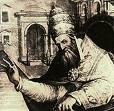

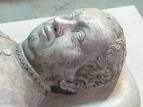

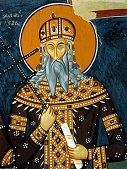
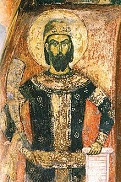


1370 On Feb. 17 (18?) the Teutonic Knights decisively defeat the Lithuanians at the Battle of Rudau N of Konigsberg, ending the Lithuanian threat in Prussia. On Apr. 5 after being crowned co-ruler of the Serbs and Greeks with Emperor Uros in 1365, ruling over the area incl. Prilep, Prizren, and Skopje, Vukasin Mrnjavcevic (1320-71) issues a charter signing himself as "Lord of the Serb and Greek Lands and of the Western Provinces"; later this year or early next year he crowns his eldest son Prince Marko Mrnjavcevic (1335-95) as "Young King", i.e. heir apparent, becoming king and co-ruler with Emperor Uros after his father dies on Sept. 26, 1371, and sole king on Dec. 4, 1371 after Uros dies. The original Brussels sprouts as time goes by for Jews? On May 22 Christians massacre hundreds of Jews in Brussels for allegedly planning to pierce stolen holy wafers with poniards; the rest of the Jews are expelled, and don't return until 1713. In Aug. after Hundred Years' War veteran John de Neville, 3rd Baron Neville de Raby (1337-88) is appointed adm. of the English fleet (until 1378), and English troops ravage the French countryside, winning control of much of S France, sieging Limoges, its bishop surrenders the city to the English, after which English Prince Edward of Woodstock (1330-76) decides he needs a little black fun and sacks it in Oct., massacring 3K, earning the title of Black Prince, which is later subject to a coverup attempt that it's only his black armor; meanwhile the English Parliament begins stepping up protests against the misgovt. of senile old fart Edward III. In Aug. Byzantine emperor John V comes to Rome to discuss the unification of the Eastern and Western churches with Pope Urban V, but the talks get hung up on matters of ritual; in Sept. unsettled conditions in Rome cause Pope (since 1362) Urban V (b. 1310) to return to Avignon, and he dies on Dec. 19; on Dec. 30 Limousin-born Pierre Roger de Beaufort is elected Pope (#200) Gregory XI (1331-78) (until Mar. 27, 1378). In Dec. after "the Eagle of Brittany" Bertrand du Guesclin (1320-80) is made constable of France, the French begin reconquering Poitou and Brittany, and score a number of bloody Vs against the English, earning Olivier III de Clisson (1336-1407) the title of "the Butcher" - the Black Olive? On Nov. 5 king (since 1333) Casimir III the Great (b. 1310) dies without leaving an heir, and the Piast Dynasty in Poland piasts out; his Anjevin nephew Louis I the Hungarian (the Great) (1326-82) of Hungary becomes king of Poland (until Sept. 10, 1382), personally uniting Hungary and Poland and becoming the most powerful Hungarian monarch ruling over an empire "whose shores were washed by three seas", ending up spending most of his attention on all them ?!*!? little kings in Hungary. The Lithuanians siege Moscow again. The German Hanseatic League wins a series of Vs over Waldemar IV of Denmark, who returns to Denmark after signing the Treaty (Peace) of Stralsund on May 24, which gives them a virtual trade monopoly in Scandinavia, incl. four castles which dominate the sound, control of Scandinavian revenues for 15 years, and the right to interfere in the royal Danish succession if their monopoly is not renewed by the candidate; the Hanseatic League is now king in the Baltic Sea, which becomes a German lake. With visions of Genghis Khan dancing in his head, Turkic Mongol warlord Tamerlane (Tamburlaine) (Timur-i Lang) (Timur Lenk) (Timur Leng) (Temur the Lame) (Tamerlano) (1336-1405) ("timur" = iron) gains control of the W Chagatai Khanate, going on to campaign across W, S, and C Asia, followed by Caucasus and S Russia, going on to becoming the most powerful ruler of the Muslim World and found the short-lived Timurid Empire. Bernabo Visconti makes two papal delegates attempting to serve him a rolled excommunication parchment from the pope bearing a leaden seal and wrapped in a silk cord eat the whole thing. Peter IV of Aragon orders the compilation of the Chronicle of San Juan de la Pena to justify the authority of the crown. Architecture: The town hall in Aix-la-Chapelle (begin 1333) is finished. Gray's (Grey's) Inn (Hall) (Manor House) (originally Portpoole Manor) in C London, England is leased by a group of lawyers, named after Portpoole Manor owned by Reynold de Grey, 1st Baron Grey of Wilton (1240-1308), descendant of Norman knight Anchetil (Norse "god-helmet") de Greye (1052-1087), who accompanied William the Conqueror to Britain; it becomes one of the four Inns of the Court around the Royal Courts of Justice in London (Lincoln's Inn, Middle Temple, Inner Temple); members incl. Francis Bacon, William Cecil, and Gilbert Gerard. Inventions: The steel crossbow is first used in war by ? against ? Births: Italian humanist statesman Pier Paolo Vergerio the Elder (d. 1445) on July 23 in Capodistria, Repub. of Venice. Danish king (1376-87) and Norwegian king (1380-87) Olaf II/IV Haakonsson (d. 1387); son of Haakon VI of Norway; grandson of Magnus IV of Sweden. Austrian Hapsburg duke William the Ambitious (the Courteous) (d. 1406) in Vienna; eldest son of Leopold III (1351-86); brother of Leopold IV (1371-1411), Ernest the Iron (1377-1424), and Frederick IV (1382-1439). Lithuanian grand duke (1430-2) Svitrigaila (Svidrigiello) (d. 1452); son of Olgerd (Algirdas) (1296-1377) and Uliana of Tver (Russia); brother of Jogaila (1362-1434); baptized as Greek Orthodox, in 1381 he converts with his mother and brother Jogaila to Roman Catholicism. Dutch printer Laurens Janszoon Koster (d. 1455) (d. 1440?) in Haarlem. Deaths: Polish king (1333-70) Casimir III the Great (b. 1310) on Nov. 5 in Cracow. Italian pope (Blessed) Urban V (b. 1310) on Dec. 19.
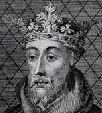



1371 The plague returns to England, although milder than in 1361. In Jan. ailing Black Prince Edward leaves France for England, giving the rule of Aquitaine and command of his armies in France to his incompetent younger brother John of Gaunt, Duke of Lancaster (1340-99), who loses town after town, until only Bayonne, Bordeaux, Brest, Calais, and Cherbourg remain in English hands by 1380, causing Edward III's prestige to sink and baronial influence to increase. On Feb. 22 king (since June 7, 1329) David II of Scotland (b. 1324), known for his "raddure" (fearful personal authority) dies in Edinburgh Castle from illness caused by old wounds, ending the Bruce Dynasty, and his 54-y.-o. nephew Robert II Stewart (1316-90) (grandson of Robert I and Isabella of Mar, and son of Walter, 6th high steward of Scotland, and Marjorie, daughter of Robert the Bruce) is crowned king of Scotland (until Apr. 19, 1390), founding the Scottish Stewart (Stuart) Dynasty which battles the rival House of Douglas (earl of Douglas = Black Douglas, earl of Angus = Red Douglas) (whose crest is a green salamander on a chapeau surrounded by fire) (until 1455), and lasts three cents. (until 1714); in the spring he buys his way out of a succession challenge by William of Douglas, 1st Earl of Douglas (1327-84); an old fart whose campaigning days are over, he contents himself with portraying himself on horseback in his prime in his Great Seal of Robert II, deciding to spread his realm among "the sons he maid rych and mychty", going on to give them seven of Scotland's 15 earldoms by 1382, with Fife and Menteith going to his 2nd son Robert, Buchan, Ross and Badenoch in the NE going to his 4th son Alexander, and Caithness and Strathearn to his 5th son David; in addition Robert's eldest son John is earl of Atholl and Carrick, and his sons-in-law John MacDonald, John Dunbar, and James Douglas control the earldoms of the Isles, Moray, and Douglas, respectively, for a total of 13; Robert gets a parliamentary act passed giving his sons and their male heirs the succession, and allows his Scots to raid and seize disputed lands on the English border, causing traffic (commercial, church, pilgrim) between the countries to cease, and threatening the anything-but-biblical peace of David II. On Sept. 26 the Serbs are defeated by the Ottoman Turks at the Battle of Maritsa (Chernomen) on the Maritsa River near Chernomen (modern-day Ormenio), Greece, and since their Roman Catholic brothers won't help them, the Orthodox Catholic Byzantines are up against the icon-filled wall; meanwhile Bulgaria is partitioned into two kingdoms centered on Vidin and Trnovo, while NE Bulgaria is contested by several warlords; Vidin falls to the pesky Ottomans in 1388, and Trnovo in 1393. The English defeat the Flemish at the naval Battle of Bourgneuf. John of Gaunt, his first breed mare, er, wife Blanche of Lancaster having died in 1369, wastes no time and marries Peter the Cruel's daughter Constance of Castile (1354-94) (don't be cruel?), gaining a claim to the throne of Castile. King Hakon of Norway invades Sweden; King Albrecht agrees to compromise, and frees Magnus from prison. English chancellor William of Wykeham (1320-1404), bishop of Winchester asks Parliament for funds to fight the war, and the anticlerical opposition causes the House of Lords to resolve that English clergy cannot hold the offices of chancellor, treasurer, baron of the exchequer, or clerk of the privy council; John of Gaunt sees his chance to use anticlerical feeling for political gain? Emperor (since 1352) Go-Kogon (b. 1336) abdicates in favor of his son Go-En'yu (1359-93) (personal name Ohito), who becomes Japanese Ashikaga (northern) pretender emperor #5 (until 1382). The Siamese send an embassy to Nanking to pay tribute to the new Ming Dynasty. Ruhrort in Duisburg on the Ruhr River is founded as a customs post on "Homberger Werth"; the harbor is not mentioned in records until 1392. Architecture: Carthusian monks build the London Charterhouse in Smithfield, London, England; dissolved in 1537. Births: French Valois duke of Burgundy (1404-19) John II of Valois (the Fearless) (sans Pur) (d. 1419) on May 28 in Dijon; son of Philip II the Bold (1342-1402) and Margaret III of Flanders (1350-1405). German Hohenzollern burgrave of Nuremberg (1398-40) and prince-elector #1 of Brandenburg (1415-40) Frederick I (d. 1440) on Sept. 21 in Nuremberg; father of Frederick II "Irontooth" (1413-71). Hungarian queen (1382-95) Mary of Hungary (d. 1395); daughter of Louis I the Great (1326-82) and 2nd wife Elizabeth of Bosnia (1340-87). Austrian Hapsburg duke (1391-1411) Leopold IV (d. 1411); 2nd son of Leopold III (1351-86); brother of William the Ambitious (1370-1406), Ernest the Iron (1377-1424), and Frederick IV (1382-1439). Italian sculptor Jacopo della Quercia (d. 1438). Chinese eunuch Muslim (Hui) adm. Cheng Ho (Zheng He) (d. 1433) in Kunyang, Yunan Province. Scottish noble James Douglas "the Gross", 7th Earl of Douglas, 1st Earl of Avondale (d. 1443); 2nd son of Archibald "Black" Douglas, 3rd earl of Douglas (1328-1400); father of William Douglas, 8th earl of Douglas (1425-1452), James Douglas, 9th earl of Douglas (1426-91), Archibald Douglas, earl of Murray (1426-55), Hugh Douglas, earl of Ormonde (-1455), and John Douglas, earl of Balvenie (1433-63) - the original Fat Bastard? Deaths: Serbian (1365-71) king Vukasin (b. 1320) on Sept. 26 in Maritsa, Bulgaria (KIA). Scottish king (1329-71) avid II (b. 1324) on Feb. 22 in Edinburgh Castle; buried in Holyrood Abbey; his marble tomb is destroyed in the 17th cent.

1372 On June 22-23 a combined French-Castilian fleet (22 Castilian galleys, 50 English ships) under Adm. Ambrosio Boccanegra (-1373) (newphew of Genoa doge #1 Simone Boccanegra) defeats an English fleet of 48 at the naval Battle of La Rochelle, and captures the the English cmdr. the earl of Pembroke; the English lose all their ships sunk or captured, along with 400 knights and 8K soldiers, and 800 men KIA; in Aug. Edward III and Black Prince Edward sail from Sandwich with a large fleet for France, but are turned back by a storm; the French control the Channel for the first time since 1340, blocking English transport in N France; the French, led by Philip II the Bold reconquer Poitou and Brittany, and defeat England's Norman allies; English armies in France are worn down by French flank attacks, and the French take Poitiers and Angouleme; in Oct. loser Prince Edward resigns his principality of Aquitaine, and retires to his castle in Berkhampstead; meanwhile Prince of Wales Owen-ap-Thomas aided by the French captures Guernsey. The Lithuanians siege Moscow for a 3rd time (first in 1368), then in the summer sign the Treaty of Lyubutsk, ending the Lithuanian-Muscovite War (begun 1368), bringing seven years of peace. The Black Douglases acquire the Earldom of Wigtown (Wigtoun) (Wigton) (created 1341) without royal sanction, creating a bone of contention with the Stewarts (until 1455). Edward III's son Edumund of Langley (earl of Cambridge since 1362) marries Isabel, daughter of Peter the Cruel of Castile. Chinese emperor (since 1368) Ming Taizu orders the release of all people enslaved by the previous don't-make-a-grown-man-cry Mongol regime; the king of Okinawa pledges allegiance to Ming Taizu, opening Okinawa to trade; it remains a tributary of China for 500 years. Shah Hamadan arrives in Kashmir, and converts the pop. to Islam en masse. Wealthy widow Lady Penh finds a Koki tree floating down the Tonle Sap River in Cambodia in a storm, containing four bronze Buddha statues and a stone statue of Vishnu, which are used to built a temple on the hill in what later becomes Phnom Penh ("Penh's Hill"), founded at the junction of the Mekong and Tonle Sap Rivers (modern-day pop. 2.1M); it becomes the capital of Cambodia in 1434-97, and 1865-. The turning point of the lit. life of Geoffrey Chaucer (1343-1400) comes when he meets Petrarch? The Apocalypse of Angers tapestry is produced in this decade in France. Architecture: In this decade the Bastille Saint-Antoine fortress in Paris is built by Charles V, becoming immortal on July 14, 1789. The Leaning Tower of Pisa (begun 1173) is finally completed with the bldg. of the 7-bell Romanesque bell chamber by Tommaso di Andrea Pisano. Births: French duke (1392-1407) Louis I of Orleans (d. 1407) on Mar. 13 in Hotel Saint-Pol, Paris; 2nd son of Charles V and Joanna of Bourbon; younger brother of Charles VI; Scottish leader Archibald Douglas, 4th Earl of Douglas (Tyneman) (The Loser) (d. 1424). Deaths: Ethiopian emperor (since 1344) Newaya Krestos. English traveler John (Jehan) de Mandeville (b. ?); leaves the Anglo-Norman Travels to the East, a big bestseller, full of absurdities, such as that the cotton plant grows "little lambs" at the ends of its branches, which feed off grass; a lot of it is stolen from real Italian missionary Friar Odorico da Pordenone (d. 1331); used as a source by Christopher Columbus; really written by physician Johan de Bourgnone of Liege, France?


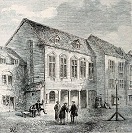
1373 On June 16 the first regular shipment of wine from Portugal to England twenty years earlier results in the Treaty of Perpetual Friendship, becoming the most enduring internat. alliance of all time; Portugal receives fishing rights off the English coast in order to encourage the wine trade; ask somebody what this has to do with Port Wine. In July John of Gaunt lands in Calais with a large army, then leads them around Paris to Bordeaux, arriving at Christmas; meanwhile French constable Bertrand du Guesclin sieges Brest, and seizes and holds most of the duchy of Brittany, earning the nickname "eagle of Brittany". Byzantine emperor John V becomes an Ottoman vassal, recognizing the suzerainty of Ottoman Sultan Murad I - love the skin you're in? Constantin IV dies, and his distant cousin (son of John of Lusignan) Levon (Leon) (Leo) V/VI (1342-93) becomes the 5th and last Lugnan (Latin) king of Lesser Armenia (Cilicia) (until 1375), facing invasions by superior Mamluk forces. HRE Charles IV gains Brandenburg from the Wittelsbachs. Scottish king Robert II gets an act of succession (entail) passed naming his eldest son John as heir, followed by John's three brothers, then his two half-brothers. Tunnage and poundage are imposed on English merchants. Boccaccio is appointed as lecturer on Dante Alighieri in Florence, but illness forces him to return to Certaldo next year. Architecture: Bohemian House of Luxembourg king and HRE (1346-78) Charles (Wenceslaus) IV (1316-78) endows the Dobrow Monastery near Pilsen (Plzen), Bohemia with the beer right, with the brewery becoming the oldest to survive to modern times. Marshalsea Prison on Borough High St. in Southwark, London S of the Thames River is built, housing men charged with sedition and crimes at sea, growing into a debtors prison by the 18th cent., turning into an extortion racket, with those who can pay enjoying college-like amenities while the rest are herded into nine small rooms like cattle, and face starvation and torture; in 1729 a parliamentary committee finds that 300 inmates starve to death in the past 3 mo.; in 1824 Charles Dickens' father is sent there; a second prison is built in 1811; in 1842 Parliament passes an act requiring inmates of Fleet Prison and Marshalsea Prison to be moved to the Queen's Bench Prison, which is renamed the Queen's Prison. Deaths: Syrian Muslim scholar Ismail ibn Kathir (b. 1301) in Feb. in Damascus; dies after going blind from too much study at night. Swedish nun St. Bridget (b. 1303); leaves Revelations, based on personal religious visions - 1373 bottles of beer on the wall?

1374 Another plague outbreak occurs in Europe (Italy and France) (next 1390). In June Edward III the Senile and Charles V the Wise agree to a 2-year French-English Truce, and Charles V makes hay while the sun shines, revamping the chain of command in the French army while continuing to revamp the navy and fortify Paris. The Hospitalers take over the defense of Smyrna. The first Jehovah's Witnesses come from Oxford? Gray-bearded Oxford U. prof. of divinity ("the Morning Star of the Reformation") John Wycliffe (OE "white cliff") (1324-84), having conquered Oxford and made it the spiritual center of England begins preaching his anti-clerical doctrines from the pulpits of London under the patronage of John of Gaunt, and is employed by the govt. to negotiate with the papacy over provisions, becoming Edward III's chaplain; as a church reformer he gets so impatient to get an English trans. of the Bible into the common man's hands that he begins translating it single-handedly, while pub. tracts decrying the secularization of the Church, and claiming that all religious doctrines should be based on the Bible, not tradition or church synods, and that people should have direct access to God and therefore don't need auricular confession, denying the core concept of the Roman Catholic Church, drawing mojo from the inability of the clergy to deal with or even explain the Black Plague except as God's judgment against them; in ? he pub. De Civili Domino (On Civil Authority or Dominion), proposing the disendowment of church property and the exclusion of the clergy from civil govt.; his itinerant proselytizing Poor Preachers, scornfully known as Lollards (Dutch "babblers") spread throughout England, at first reading portions of Wycliffe's English Bible trans. to eager crowds, then teaching people to read his Bible on their own, successfully making a large number of converts, incl. wealthy townsmen and country gentlemen, and doing so well that it is said that every 4th (3rd) (2nd) man is a Lollard. Pope Gregory XI announces that the Inquisition has the right to intervene in sorcery trials, which hitherto had been considered purely civil matters. Geoffrey Chaucer is appointed controller of the customs for hides, skins, and wool in London; the king grants him a daily pitcher of wine. Births: Polish queen/king (1384-99) (St.) Jadwiga (Jadviga) of Poland (d. 1399) on Feb. 18; Angevin daughter of Louis I the Great of Anjou, king of Hungary and Elizabeth of Bosnia. English heir presumptive (to Richard II) Roger de Mortimer, 4th Earl of March (d. 1398) on Apr. 11 in Usk, Monmouthshire; son of Edmund Mortimer, 3rd earl of March (1352-81). English bishop of Winchester (1403-47) and cardinal (1426-47) Henry Beaufort (d. 1447) in Anjou, France; 2nd son of John of Gaunt and Katherine Swynford; declared legitimate by Richard II in 1390. Italian humanist educator Guarino da Verona (d. 1460); pupil of Manuel Chrysoloras (1350-1415). Deaths: Chinese painter-poet Ni Tsan (b. 1301). Italian sonneteer Petrarch (b. 1304) on July 18; leaves Sonnets, all addressed to Laura - I'll be joining you soon, Laura? German scholar Konrad von Megenberg (b. 1309) in Ratisbon (Regensbug). Norwegian king (1319-55) and Swedish king (1319-64) Magnus II Eriksson (b. 1316) on Dec. 1. Japanese Ashikaga pretender emperor #4 (1352-71) Go-Kogon (b. 1336) on Mar. 12. Scottish queen Margaret Logie; buried in Avignon.

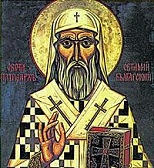
1375 On Oct. 24 Hansa-poor Danish king (since 1340) Waldemar IV Adderdag (b. 1320) dies without a male heir, and his daughter Queen Margreta negotiates for her son Olaf (Olav) to succeed him, with herself as regent. On Dec. 2 after longtime pressure from Lithuanian grand prince (since 1345) Algirdas (Olgerd) (1296-1377) and Polish king Casimir III over the failure of aging Russian metropolitan Alexis (-1378) to tend to any flock but Moscow's, Constantinople patriarch Philotheos (-1377) consecrates Bulgarian Hesychast monk Cyprian (1336-1406) as metropolitan of Kiev, Russia, and Lithuania, with the provision that he will reunite his metropolitanate with Moscow upon Alexis' death; too bad, Philotheos dies before Alexis. After Levon V surrenders Kapan Fortress to the Egyptian Sunni Muslim Mamluks, the 1.5K-y.-o. kingdom of Armenia collapses as 30K Mamluks enter the capital of Sis in Lesser Armenia; Levon is sent as a POW to Cairo for several years, until he is ransomed in 1382 with precious stones, silks, and birds of prey by John I of Castile, who makes him lord of Madrid for life, but he leaves for France in 1390 when John I dies, then dies in Calais on Nov. 29, 1393, and is buried in Paris in St. Denis Basilica under the name "Prince Lyon de Lusignan". England and France sign the Truce of Bruges, and England loses most of its possessions in France except the ports of Calais, Bordeaux, and Bayonne; John of Gaunt returns to England and allies with the corrupt court party led by his aging daddy Edward III's mistress Alice Perrers (1348-1400), for a while ruling the country while enriching himself and his favorites, stirring up opposition by the House of Commons. James IV of Majorca (b. 1336) dies after a last defeat by Aragon, and he passes his claims on Majorca to his daughter Isabel of Majorca (1337-1406), who becomes the last queen of Majorica as Elizabeth I of Mallorca and countess of Roussillon and Cerdany (until 1406). The Ottomans annex parts of the Anatolian principalities of Germiyan and Hamideli (1375-80). Dmitri Donskoi defeats Prince Mikhail II of Tver, cementing his control of Vladimir, and allowing him to gather troops to take on the Mongol Horde. (St.) Euthymius of Tarnovo (1325-1402) becomes patriarch of Bulgaria (until 1393). English begins to be taught in English schools. The Sican (Sicán) Civilization in N Peru (founded 800) ends. The capital coastal city of Oulu (Uleaborg) on the Gulf of Bothnia in N Finland is founded by the Swedes as a fort to defend against the Russians. Zerbster Bitterbier, made in Zerbst, Saxony-Anhalt, Germany (between Berlin and Hannover) is first mentioned; the town grows to 600 breweries during the Middle Ages; it is last brewed in 1949. Sports: Charles V of France prohibits the playing of chess. Nonfiction: Anon., Annals of Ulster; written about this time, covering the years from 431 C.E., later extended to 1540 C.E. Anon., The Red Book of Hergest; written about this time. Poetry: John Barbour (1316-95), The Brus (Bruce) (1370-5); pub. posth.; first major lit. figure to write in Lowland Scots; 14K-line chivalric work by the archdeacon of Aberdeen about Scottish heroes Robert I the Bruce, Sir James "Black" Douglas, and the Earl of Moray fighting for their freedom from the stankin' English, starting with the 1276 death of Alexander III and ending in 1332; paid for by Robert I's grandson Robert II, becoming the favorite of England-hating Scots for cents.; the real reason at the time is to paint the Stewarts as the rightful heirs of the Bruces, and paint pesky William Wallace off the canvas?; "Fredome mays man to haiff liking" - there is no such thing as an insignificant detail? Births: Jerusalem king (1398-1432) and Cyprus king (1398-1432) Janus of Cyprus (d. 1432) in Genoa, Italy; son of James I of Cyprus (1334-98) and Helvis of Brunswick-Grubenhagen. Dutch painter ("the Master of Flemalle") Robert Campin (d. 1444). Deaths: Florentine writer Giovanni Boccaccio (b. 1313) in Certaldo; leaves The Life of Dante and Commentary on Dante's "Divina Commedia". Danish king (1340-75) Waldemar IV Adderdag (b. 1320) on Oct. 24.

1376 In Mar. the Genoese engineer a coup against Byzantine emperor (since 1341) John V Palaeologus (b. 1332) by his son Andronicus IV Palaeologus (1348-85), who becomes Byzantine emperor (until 1379); he deposes Philotheos in favor of Genoese puppet Macarios, who becomes Constantinople patriarch (until ?), and promptly gets paid off by Moscow via Genoese bankers to cut Cyprian loose; John V and his son Manuel II are imprisoned, but escape next year with Venetian help; meanwhile the Turks, Genoese, and Venetians fight over the Byzantine throne until Manuel II's accession in 1391; "It is like a storm at sea where we are all in danger of going down" (Demetrius Cydones). On Apr. 28-July 10 the English Parliament, led by Edward the Black Prince enacts extensive reforms, becoming known as the Good Parliament; it impeaches two of the king's foremost courtier ministers, William, 4th Baron Latimer and Richard Lyons of malversation for war profiteering, becoming its first use of impeachment; they are convicted, removed, fined and imprisoned, along with several other lesser courtiers, setting the English precedent of parliamentary impeachment of the king's ministers for acting illegally, even if by the king's orders; too bad, on June 8 ailing Prince Edward (b. 1330) dies in the midst of a session before his father Edward III, opening up a long rivalry between the descendants of his two younger brothers which leads to the War of the Roses. On May 3 Olaf (Olof) (Oluf) Haakonsson (1370-87), son of King Haakon VI Magnusson of Norway and Queen Margreta (Margaret) of Denmark, and grandson of Waldemar IV of Denmark is elected king Olaf II of Denmark (until Aug. 3, 1387), with Margreta as regent; on July 29, 1380 he becomes Olav IV of Norway; he never personally exercises royal power. On July 2 Wenceslas (b. 1361), son of HRE Charles IV is elected king of the Romans (until 1419) by the six prince-electors after his daddy revokes the privileges of several imperial cities and mortgages them to various nobles for their votes, pissing-off 14 Swabian cities, which revolt on July 4, forming their own Swabian League and becoming an independent state within the empire (until 1389). On Dec. 25 aging king Edward III holds a Christmas feast at Windsor Castle, seating 10-y.-o. prince Richard (future Richard II) at his side to mark him as a heir; he is crowned 7 mo. later. Stephen Tvrtko (d. 1391) proclaims himself King Tvrtko I of Bosnia and Serbia. Dmitri Donskoi and Dmitri Konstantinovich join armies and ravage Volga Bulgaria. Brunei sultan Muhammad Shah (-1402) converts to Islam. Siam and the Thai state of Chiang Mai ("the Rose of the North") in the N Menam Valley begin two cents. of friction (until 1557); meanwhile Siam exerts strong infuence over the disunited states of Burma and the N Malay Peninsula. To avoid soiling the Seine River, butchers in Paris are allowed to use the Bievre (Bièvre) (Fr. "Beaver") River nearby, with more industry moving in and turning it gradually into a polluted industrial river with a living and dead arm; in 1875 the city decides to conceal it, making it part of the sewer system. John Wycliffe begins translating the Latin Bible into English (finished in 1381). Hamburg, Germany has 457 burgher-owned breweries, growing to 531 in 1526; the main product is whitish Keutebier ale, made mostly of wheat, which by the early 20th cent. evolves into Kolsh (Kölsch) pale ale. Births: Czech archbishop of Prague #5 (1403-11) Zbynek Zajic of Hazmburk (Hasenburg) (d. 1411) in Bohemia; purchases the archbishop post in 1402 for 2.8K gulden plus 1.48K gulden to cover his predecessors' debts. Spanish poet-historian Perez de Guzman (d. 1458). Deaths: English prince of Wales Edward the Black Prince (b. 1330) on June 8 in London; buried in Canterbury Cathedral, where his armor is hung, parts of which survive to modern times; his father Richard II orders the tomb built as much as a decade after his death, ordering two identical tombs along with his father Edward III.






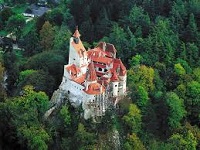
1377 In late May pagan Lithuanian grand duke (since 1345) Olgerd (Algirdas) (b. 1296) dies, and his pagan son Jogaila becomes grand duke Wladyslaw II Jagiello (Jogaila) (1362-1434) along with his uncle Kestutis (until 1382); Hapsburg Duke Albert III "the Pigtail" of Austria goes on crusade against him. On Jan. 27-Mar. 2 after the Good Parliament closes on July 27, and John of Gaunt regains power and returns Alice Perrers to court, the Bad Parliament (last during the reign of Edward III) convenes, undoing the work of the Good Parliament in fighting corruption in the royal council and passing the first-ever poll tax of 4 pennies for every person over age 14, which taxes even the poor and causes a peasant rebellion to simmer, electing for the first time a speaker for the House of Commons, Sir Peter de la Mare (1294-1387) in Oct.-Nov., followed next (this?) Jan. by Sir Thomas de Hungerford (-1397); in May they dislodge John of Gaunt from power, and banish Alice Perrers from court, to the dismay of Edward III; unfortunately (or luckily, depending on whose side you're on?), on June 21 half-cent.-in-power (since Jan. 25, 1327) Edward III (b. 1312) dies (after calling Parliament 27x since 1337, although they actually meet 37x), and on June 21 Black Prince Edward's 10-y.-o. son (Lionheart Not)?) Richard II (1367-1400) is named heir apparent, and crowned as England's 32nd monarch (until Sept. 29, 1399), with his uncle Edmund of Langley as regent and his uncle John of Gaunt retaining his military power. On June 23 (two days after Richard II's accession) the French renew their war with England, and use their control of the seas to attack the English across the English Channel in the summer, sacking Lewes, Plymouth, Hastings, and Rye. Better late than never? The the summer the first plague quarantine ("40") (actually 30-40 day isolation) station is set up in the coastal town of Cavtat in Croatia, followed by the nearby coastal town of Dubrovnik (AKA Ragusa) on July 27; N Italy follows, with quarantines set up in Venice and other Mediterranean ports. On Nov. 19 Louis I of Hungary issues a decree giving the Saxons of Kronstadt (Brasov) the right to build a castle on the border between Transylvania and Wallachia, which becomes Bran Castle, which in 1438-42 is used to defend against the Ottomans, and is featured in Bram Stoker's 1897 novel "Dracula". On Dec. 12 gouty aging HRE Charles IV visits Paris (until Jan.), wowing everybody and becoming the biggest event of the decade in France; on his progress to Paris he rides into towns on a gray horse instead of a white horse to downplay his imperial status. On Dec. 25 new king Richard II holds a Christmas feast at which 28 oxen and 300 sheep are eaten. Shortly before croaking, Edward III knights his sons Richard II and Henry IV, along with Henry Percy (b. 1364) (later called Hotspur), son of Henry Percy, 1st Earl of Northumberland (1341-1408), and he joins his dad in leading an army of 10K men into Scotland to revenge the burning of Roxborough, ravaging the lands of the earl of March; Robert II discontinues payments on David II's 1357 ransom, ending the truce. After stigmata-toting Dominican nun (St.) Catherine of Siena (1347-80) talks him into it, Pope Gregory XI moves the papacy back from Avignon to Rome, ending the Babylonian Captivity (begun 1309) for real; he goes on to condemn the doctrines of John Wycliffe, who shoots back with more tracts; from now on most of the popes are Italian; the Lateran is almost in ruins, so the papal court is moved to the Vatican, which has the advantage of being much closer to the papal stronghold of Castel Sant' Angelo - and its Star Wars transformers that can go into mech mode? Roman Catholics in England are robbed of their favorite monkey candy dish? The English bishops summon John Wycliffe to appear before them at St. Paul's to answer for his anti-clerical teachings, where John of Gaunt supports him against William of Wykeham; the proceedings are ended by anti-Gaunt demonstrators, who paradoxically save Wycliffe's neck. Vilnyus (Vilnius), Lithuania is sacked by the Teutonic Knights. Ferdinand I of Portugal grants a Letter of Privileges, encouraging the growth of the Portuguese mercantile marine. Richard II of England renews the privileges of the Hanseatic League, who confirm their power despite an increase in customs dues. The male line of the Marmyons dies out, and Richard II gives the office of queen's (royal) champion to Margaret Marmyon's husband Sir John Dymoke of the village of Dymock in Gloucestershire, known for the Dymock Red cider apple, Stinking Bishop cheese, and yellow spring daffodils; the line continues until ?. Architecture: The Gothic Ulm Minster in Germany is begun (consecrated in 1405, finished in 1545), ending up with the highest steeple in the world (161.53m), and a 141m-high viewing platform with 768 steps. Inventions: Playing cards begin to displace dice in Germany - it gives them that whole tropical feeling? Nonfiction: Ibn Khaldun (1332-1406), The Muqaddimah (Intro. or Prolegomena to History); about the necessary preconditions of a just govt.; an introduction to his planned magnus opus on world history "Kitab al-Ibar", becoming the first book on the philosophy of history, discussing historiography as a science and pioneering cultural history, warning against systematic bias, becoming the earliest known work to critically examine military history, pioneering several concepts incl. the labor theory of value and the division of labor (asabiyya), supply-side economics and the Laffer Curve, claiming that humans developed from "the world of the monkeys" after Creation "started out from the minerals and progressed in an ingenious, gradual manner to plants and animals", exposing alchemy as a fraud, pioneering climate theory; calls Aristotle the "First Teacher"; too bad, he accepts slavery as okay with Islam, with the soundbyte: "The Negro nations are, as a rule, submissive to slavery, because (they) have little that is (essentially) human and possess attributes that are quite similar to those of dumb animals." Births: Japanese Ashikaga pretender emperor #6 (1382-1412) and emperor #100 (1392-1412) Go-Komatsu (Motohito) (d. 1433) on Aug. 1; eldest son of Go-En'yu (1359-93). Portuguese House of Braganza founder Afonso I, 1st Duke of Braganza, 8th Count of Barcelona (d. 1461) on Aug. 10 in Veiros, Estremoz, Alentejo; son of Joao I (1357-1433) and Ines Peres; husband (1401-) of Beatriz Pereira de Alvim (1380-1415); father of Afonso, 1st Marquis of Valenca (1400-60), Isabella, Lady of Reguengos de Monsaraz (1402-65), and Duke Ferdinando I, 2nd duke of Braganza (1403-78). Austrian Hapsburg Leopoldian duke of Inner Austria (1406-24) Ernest the Iron (d. 1424) in Bruck an der Mur, Styria; 3rd son of Leopold III (1351-86); brother of William the Ambitious (1370-1406), Leopold IV (1371-1411), and Frederick IV (1382-1439); father of HRE Frederick III (1415-93). Italian Renaissance architect Filippo Brunelleschi (d. 1446) in Florence; backed by the Medicis; first to discover how to use a central vanishing point for perspective; first to use true columns for structural support since classical Rome; designer of Pitti Palace, and the cupola for the Florence Duomo. Persian shah (1405-47) Shah Rukh (Pers. "Face of the King") Mirza (d. 1447) on Aug. 20; 4th and youngest son of Timur; named after a chess move his daddy was making when given news of his birth. Deaths: Lithuanian grand duke (1345-77) Olgerd (Algirdas) (b. 1296) in late May; burned on a ceremonial pyre with 18 horses in the woods near Maisiagala; dies pagan, but a later coverup makes him out to be Greek Orthodox. French #1 poet-composer Guillaume de Machaut (b. 1300) in Apr.; leaves 400 poems incl. 235 ballades, 76 rondeaux, 39 virelais, 24 lais, 10 complaines, and 7 chansons royales, making a fan of Geoffrey Chaucer. Moroccan Muslim world traveler Muhammad Ibn Battuta (b. 1304) - after tooting his horn for Muhammad? English king (1327-77) Edward III (b. 1312) on June 21 in Sheen Palace, Richmond.




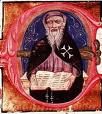
1378 After 1335 didn't work out, the Joachites seize on the late 13th cent. prophesies of Arnold of Villanova (1238-1310) and claim that this is definitely the year in which Antichrist will appear - demanding steel nerves and the maximum concentration? Every day is a winding road, whoops? First the Babylonian Captivity of 1309-67, now the Great (Western) Schism, sprouting clone popes? On Mar. 27 Pope (since 1370) Gregory XI (b. 1331) dies, and on Apr. 8 Naples-born Bartolomeo Prignano is elected Pope (#201) Urban VI (1318-89) after a short conclave featuring a lot of kibbutzing by pro-Italian forces, aided by ever-wounded St. Catherine of Siena; he decides to rule in Rome; the cardinals who elected him reconsider and nullify the election, then on Sept. 20 elect Robert of Geneva (Cambrai) as Antipope Clement VII (1342-94) whom they set up in Avignon, becoming the first antipope of the Great (Western) (Papal) Schism (ends 1417), while Pope Urban VI continues in the Vatican, laying back and enjoying the show while these are the days where anything goes and two or even three popes rule the infallible Church at the same time; England backs the Roman pope, while Scotland backs the Avignon antipope. In the spring after St. Alexius (b. 1295) dies, Bulgarian Hesychast Cyprian (1336-1406) travels from Constantinople to Moscow to become its metropolitan under the terms of a decree of deposed patriarch Philotheos, and in June he reaches the gates of Moscow, only to be blocked by orders of grand duke Dmitri II Donskoi, which doesn't stop him from sneaking in and getting consecrated as metropolitan of Kiev and Lithuania by Philotheos, only to be imprisoned then booted out so that a separate metropolitan for Great Russia (Moscow and environs) can be set up, with Mityai as patriarch #1; in 1389 Moscow finally accepts Cyprian as metropolitan of All Russia. On Aug. 4 cruelty-loving Galeazzo II Visconti (b. 1320) dies, and his son Gian Galeazzo Visconti (1347-1402) and surviving brother Bernabo Visconti (-1385) become joint rulers of Milan (until 1385). On Aug. 11 the Battle of the Vozha River is a V for the Russians under Dmitri Donskoi over a Mongol Golden Horde army sent by Khan Mamai to punish them for increasing their power in disobedience, becoming the first major V by the Russies over the Golden Horde, exposing the vulnerability of the Tatar cavalry. On Nov. 29 HRE (since 1355) Charles IV (b. 1316) dies in Prague, and his eldest son (brother of Sigismund I) Wenceslaus (Wenceslas) (Wenzel) IV (the Drunkard) (the Lazy) of Luxembourg (1361-1419), king of Germany since 1376 becomes king of Bohemia and uncrowned HRE (until Aug. 20, 1400), supporting the Roman pope; Sigmund of Luxemburg (1368-1437) becomes prince-elector of Brandenburg (until 1388, then again in 1411-15). The War of Chioggia (ends 1381) begins between commercial rivals Venice and Genoa (their 4th war); Genoa allies with Hungary. John de Neville is appointed Edward III's lt. in Aquitaine (until 1381). John Wycliffe is brought to trial for a 2nd time at the order of the pope, but the English govt. backed by the people rise to his defense, and the queen mother forbids the bishops to pronounce sentence; the bishops adjourn his heresy hearing permanently under pressure of a London mob, and Wycliffe starts a program of payback against the popes, questioning the authority of the Holy See in his copious English writings, which soon deny the sacraments, esp. the doctrine of transubstantiation. Hospitaller grandmaster Juan Fernandez de Heredia (1310-96) is captured by the Albanians. Madura, India is conquered by Vijayangar, ending the Muslim dynasty (founded 1334). Rottweil in Swabia, S Germany becomes a free city with its own constitution, establishing itself as a trading post for cattle and grain. Sufi Muslim Muhammad Sa'im al-Dahr from Sa'id al-Su'ada becomes so outraged at seeing local peasants making offerings to the Great Sphinx of Giza that he destroys the nose, and is hanged for vandalism; later blamed on Napoleon. The first mystery plays are performed in York. Births: Scottish royal heir (1390-1402) David Stewart, 1st Duke of Rothesay, Earl of Atholl, and Earl of Carrick (d. 1402) on Oct. 24; eldest son of Robert III (1340-1406) and Annabella Drummond (1350-1401); named in honor of David II, his father's enemy? Italian painter Gentile da Fabriano (d. 1427). Italian humanist scholar Vittorino da Feltre (Ramboldini) (d. 1446 in Feltre, Belluno, Repub. of Venice; student of Gasparino da Barzizza. Italian sculptor Lorenzo Ghiberti (d. 1455); known for his reliefs. Deaths: Russian Orthodox metropolitan of Kiev and All Russia (1354-78) St. Alexius (b. 1295); canonized in 1448. Greek patriarch of Constantinople (1353-4, 1364-76) Philotheos Kokkinos (b. 1300). Bohemian king (1346-78), Italian king (1355-78), and HRE (1355-78) Charles IV of Luxembourg (b. 1316) on Nov. 29 in Prague. Italian ruler (of Milan) Galeazzo II Visconti (b. 1320) on Aug. 4 in Pavia. Italian ruler of Milan (1327-78) Galeazzo II Visconti (b. 1320) on Aug. 4 in Pavia.
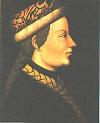
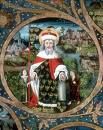


1379 In the spring after being robbed on the Danube River, then visiting patriarch Euthymius of Turnovo, Bulgarian-born metropolitan of Kiev Cyprian arrives back in Constantinople, and shortly thereafter John V and Manuel II break out of prison with Venetian and Turkish help, causing Andronicus IV to flee by rowboat across the Golden Horn to the Genoese quarter in Galata along with his mother Helena and her aging father John VI Cantacuzene, after which patriarch Macarios is deposed, with Cyprian signing the deposition orders, and uttering he soundbyte: "I could not go out of it [Constantinople] because the imperial city was beleagured by much disorder and trouble; the sea was held by the Latins [warring Venetians and Genoese], whereas the dry ground was controlled by the God-hating Turks"; meanwhile boyar-backed Moscow metropolitan Mityai travels unsuspecting to Constantinople, stopping to receive support from the Golden Horde in Sarai, then suddenly drops dead before reaching it, causing the Muscovites to forge documents making priest Pimen (-1389) the new metropolitan, then learning of the fall of Macarios and turning back to Moscow; meanwhile Patriarch Euthemius of Turnovo launches the Second Slavic Influence (first was by Cyril and Methodius), an infusion of Hesychasm into easy-sell Russia, along with an effort to replace obsolete Church Slavonic. On May 29 king (since Mar. 23, 1369) Henry II of Trastamara (b. 1334) dies, and his son Juan (John) I of Castile (1358-90) becomes Trastamara king of Castile and Leon #2 (until Oct. 9, 1390), becoming the last monarch of Castilian to receive a formal coronation. In Aug. after the Genoese fleet, aided by the Hungarians and Paduans blockades Venice, it captures Chioggia, then is itself encircled by the Venetian fleet in Dec. On Sept. 9 after their brothers Rudolf IV and Frederick III die without heirs, the remaining brothers Albert III the Pigtail (1349-95) and Leopold III (1351-86) sign the Treaty of Neuberg, dividing the Hapsburg territories between them, with Albert receiving Nearer Austria, and Leopold receiving Styria, Carinthia, Tyrol, and Further Austria; Albert, a budding mathematician goes on to support the arts and sciences and expand the U. of Vienna. The Navaresse Co. from Spain allies with a Florentine force to attack the Catalan Duchy of Athens. The rosy-crossy Sinclair family of Scotland obtains the earldom of Orkney, followed by land in Caithness in 1455. The U. of Erfurt in Erfurt, Thuringia 130 mi. SW of Berlin is chartered by Antipope Clement VIII, then rechartered in 1389 by Pope Urban V, opening in 1392 and going on to become a center of humanism with the largest univ. enrollment in Germany until it is closed in 1816; it is reopened in 1994, making it the oldest and youngest univ. in Germany; alumni incl. Martin Luther. New College (The Warden and Scholars of St. Mary's College of Winchester in Oxford) is founded at Oxford U. by Winchester bishop William of Wykeham (1320-1404), along with New (St. Mary's College School) to educate its 16 chapel choristers. Births: Spanish (Castilian) king (1390-1406) Henry III (the Sufferer) (the Infirm) (d. 1406) on Oct. 4 in Burgos; son of Juan I of Castile and Eleanor of Aragon; brother of Ferdinand I (1380-1416). Dutch printer Laurens Janszoon Coster (d. 1440) (b. 1370?) in Haarlem. Deaths: Castilian Jew-killing king (1369-79) Henry II of Trastamara (b. 1334) on May 29 in Santo Domingo de la Calzada.